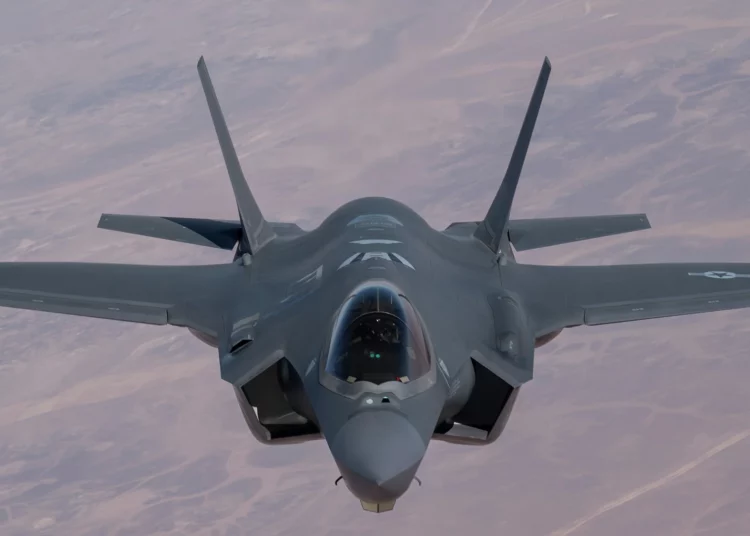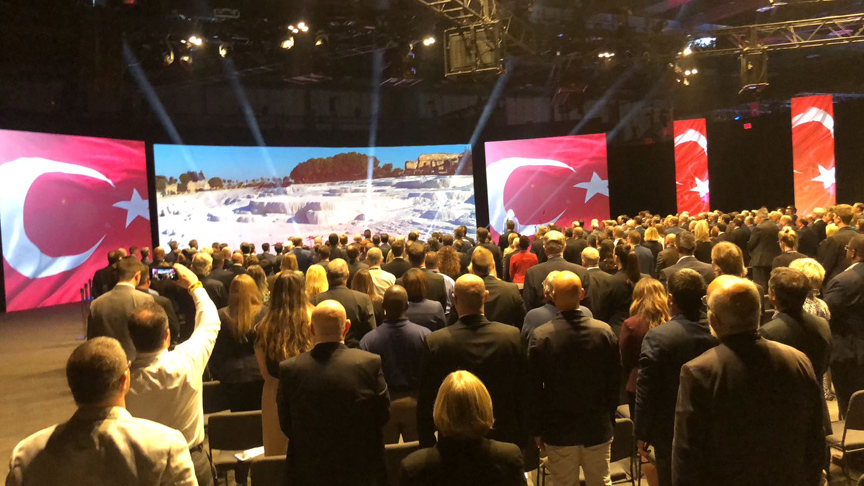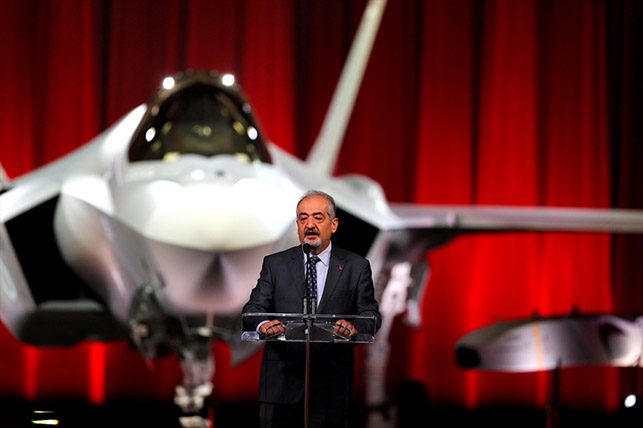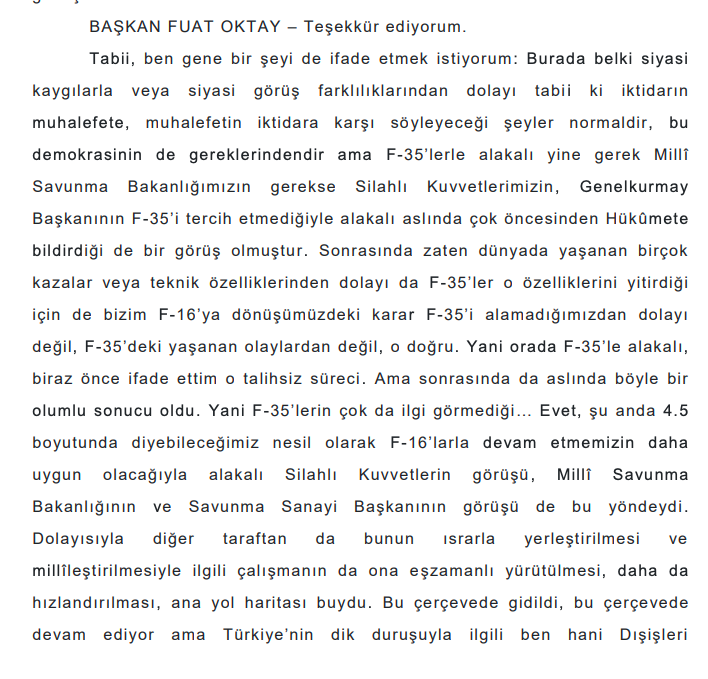WHY THEY WANT THE F-16
December 29, 2023

Levent Kenez/Stockholm
In a statement made during a parliamentary Foreign Relations Committee meeting on Tuesday, Chairman Fuat Oktay, the former Turkish vice president, claimed that Turkey had decided on its own against the acquisition of F-35 fighter jets.
Oktay said both the Ministry of Defense and the chief of general staff had expressed their disinclination to acquire the F-35s long before. He highlighted the stance of the Turkish Armed Forces (TAF) and the government, advocating for the purchase of the F-16 Block 60, 4.5 generation of the aircraft, deeming it a more suitable option.
In 2021 the US administration officially removed Turkey from the F-35 Joint Strike Fighter program due to Ankara’s purchase of the Russian S-400 missile system in 2017.
According to Oktay, the declining appeal of the F-35 was attributed to a series of accidents and technical deficiencies, leading to a loss of attraction for the aircraft. Oktay clarified that Turkey’s reversion to the F-16 was not due to an inability to procure the F-35s but rather to the lack of significant interest in the F-35.
Oktay further emphasized the positive outcome following the S-400 crisis with the US, indicating that it had impacted Turkey’s strategic decision-making, resulting in a favorable outcome regarding the F-35 aircraft.
President Recep Tayyip Erdogan had previously announced that Turkey paid $1.25 billion to participate in the F-35 program. Part of the supply chain for F-35 production, Turkey was expected to generate $9 billion in revenue. Additionally, the six F-35 aircraft produced for Turkey were not delivered by the United States. Turkey paid approximately $2.5 billion to Moscow for the first batch of S-400s. Experts estimate that Turkey has incurred a loss of $13 billion so far, considering the inactive status of the S-400 system.
Turkey seeks to redirect funds initially allocated for the F-35 program towards the purchase of new F-16 fighter jets. The US expects Turkey to quickly approve Sweden’s NATO membership to facilitate the F-16 sale, adding further complexity to the negotiations. It is as of yet uncertain whether the US Congress will approve the sale.
Russia sent two S-400 batteries and more than 120 long-range missiles as part of the agreement along with experts to train Turkish soldiers on how to operate them. The second batch has yet to be delivered.
The US has repeatedly warned Turkey that activating the S-400 missiles or buying a second batch would trigger heavier sanctions under the Countering America’s Adversaries through Sanctions Act (CAATSA). On December 14, 2020, the US imposed sanctions on Turkey’s Presidency of the Defense Industry (Savunma Sanayii Başkanlığı, SSB) and certain of its principal officers over the S-400 procurement.
On June 20, 2018 a ceremony took place at the Lockheed Martin facilities in Texas to mark the delivery of the first aircraft as part of the F-35 project, in which Turkey was a program partner. At the ceremony the then-head of the Undersecretariat for the Defense Industry (later renamed the Presidency of the Defense Industry, SSB), Serdar Demirel, representing the government, said participation in the F-35 project was an honor for Turkey. The aircraft was expected to be brought to Turkey in 2019 following the completion of pilot training

December 29, 2023

Levent Kenez/Stockholm
In a statement made during a parliamentary Foreign Relations Committee meeting on Tuesday, Chairman Fuat Oktay, the former Turkish vice president, claimed that Turkey had decided on its own against the acquisition of F-35 fighter jets.
Oktay said both the Ministry of Defense and the chief of general staff had expressed their disinclination to acquire the F-35s long before. He highlighted the stance of the Turkish Armed Forces (TAF) and the government, advocating for the purchase of the F-16 Block 60, 4.5 generation of the aircraft, deeming it a more suitable option.
In 2021 the US administration officially removed Turkey from the F-35 Joint Strike Fighter program due to Ankara’s purchase of the Russian S-400 missile system in 2017.
According to Oktay, the declining appeal of the F-35 was attributed to a series of accidents and technical deficiencies, leading to a loss of attraction for the aircraft. Oktay clarified that Turkey’s reversion to the F-16 was not due to an inability to procure the F-35s but rather to the lack of significant interest in the F-35.
Oktay further emphasized the positive outcome following the S-400 crisis with the US, indicating that it had impacted Turkey’s strategic decision-making, resulting in a favorable outcome regarding the F-35 aircraft.
President Recep Tayyip Erdogan had previously announced that Turkey paid $1.25 billion to participate in the F-35 program. Part of the supply chain for F-35 production, Turkey was expected to generate $9 billion in revenue. Additionally, the six F-35 aircraft produced for Turkey were not delivered by the United States. Turkey paid approximately $2.5 billion to Moscow for the first batch of S-400s. Experts estimate that Turkey has incurred a loss of $13 billion so far, considering the inactive status of the S-400 system.
Turkey seeks to redirect funds initially allocated for the F-35 program towards the purchase of new F-16 fighter jets. The US expects Turkey to quickly approve Sweden’s NATO membership to facilitate the F-16 sale, adding further complexity to the negotiations. It is as of yet uncertain whether the US Congress will approve the sale.
Russia sent two S-400 batteries and more than 120 long-range missiles as part of the agreement along with experts to train Turkish soldiers on how to operate them. The second batch has yet to be delivered.
The US has repeatedly warned Turkey that activating the S-400 missiles or buying a second batch would trigger heavier sanctions under the Countering America’s Adversaries through Sanctions Act (CAATSA). On December 14, 2020, the US imposed sanctions on Turkey’s Presidency of the Defense Industry (Savunma Sanayii Başkanlığı, SSB) and certain of its principal officers over the S-400 procurement.
On June 20, 2018 a ceremony took place at the Lockheed Martin facilities in Texas to mark the delivery of the first aircraft as part of the F-35 project, in which Turkey was a program partner. At the ceremony the then-head of the Undersecretariat for the Defense Industry (later renamed the Presidency of the Defense Industry, SSB), Serdar Demirel, representing the government, said participation in the F-35 project was an honor for Turkey. The aircraft was expected to be brought to Turkey in 2019 following the completion of pilot training
.

Serdar Demirel
Oktay left unanswered the question as to why the option of international arbitration wasn’t considered for the delivery of F-35s produced and paid for by Turkey, as raised by opposition lawmakers in the committee meeting. He said Turkey’s domestically produced KAAN aircraft would be more advanced than the F-35.
Initially unveiled to the public during Erdogan’s re-election campaign in May, KAAN underwent a taxiing test on the runway, marking its introduction. However, the opposition criticized this display, labeling it a political maneuver to solicit support during the election. They contended that showcasing a non-flying aircraft was unnecessary and alleged that the KAAN project was not progressing as quickly as portrayed by the government. Financial challenges were also raised as concerns by the opposition.
Oktay left unanswered the question as to why the option of international arbitration wasn’t considered for the delivery of F-35s produced and paid for by Turkey, as raised by opposition lawmakers in the committee meeting. He said Turkey’s domestically produced KAAN aircraft would be more advanced than the F-35.
Initially unveiled to the public during Erdogan’s re-election campaign in May, KAAN underwent a taxiing test on the runway, marking its introduction. However, the opposition criticized this display, labeling it a political maneuver to solicit support during the election. They contended that showcasing a non-flying aircraft was unnecessary and alleged that the KAAN project was not progressing as quickly as portrayed by the government. Financial challenges were also raised as concerns by the opposition.

Snapshot from the ceremony marking the delivery of the first F-35 to Turkey in 2018.
TAI KAAN, also referred to as the TF (Turkish Fighter) — Milli Muharip Uçak [National Combat Aircraft] in Turkish, or MMU — is an advanced, twin-engine, stealth, all-weather air superiority fighter currently in development by Turkish Aerospace Industries (TAI). British BAE Systems operates as a subcontractor for this ambitious project. Its main objectives include replacing the aging F-16 aircraft in service with the Turkish Air Force and potentially being available for export to other nations.
The initial delivery of the KAAN to the Turkish Air Force is slated for 2028, while the quest for a suitable engine is ongoing. Presently, the prototypes are equipped with American-made F110 engines, planned for the initial production of the first 20-25 units of KAAN.
At present, two companies have shown interest in producing a specialized engine for KAAN. British company Rolls-Royce has collaborated with Turkey’s Kale Group to enter the competition. Simultaneously, Ukrainian company Ivchenko Progress has also submitted a proposal for the aircraft engine.
In a media statement in May, TAI President Temel Kotil outlined plans to deliver 20 units of KAAN Block-10 aircraft to the Turkish Air Force by the year 2028.
TAI KAAN, also referred to as the TF (Turkish Fighter) — Milli Muharip Uçak [National Combat Aircraft] in Turkish, or MMU — is an advanced, twin-engine, stealth, all-weather air superiority fighter currently in development by Turkish Aerospace Industries (TAI). British BAE Systems operates as a subcontractor for this ambitious project. Its main objectives include replacing the aging F-16 aircraft in service with the Turkish Air Force and potentially being available for export to other nations.
The initial delivery of the KAAN to the Turkish Air Force is slated for 2028, while the quest for a suitable engine is ongoing. Presently, the prototypes are equipped with American-made F110 engines, planned for the initial production of the first 20-25 units of KAAN.
At present, two companies have shown interest in producing a specialized engine for KAAN. British company Rolls-Royce has collaborated with Turkey’s Kale Group to enter the competition. Simultaneously, Ukrainian company Ivchenko Progress has also submitted a proposal for the aircraft engine.
In a media statement in May, TAI President Temel Kotil outlined plans to deliver 20 units of KAAN Block-10 aircraft to the Turkish Air Force by the year 2028.

Minutes of the committee meting on December 26, 2023.
The first test flight of KAAN was scheduled for December 27, but due to the preparations and several tests not being completed on time, this flight has been postponed to a later date. Experts predict that there will also be delays in the delivery of the aircraft to the Turkish Air Force.
Meanwhile, Oktay has been alleged to have received $50 million in bribes from a criminal organization to prevent the government from seizing its assets in the country. These allegations surfaced from recordings made public by prominent investigative journalist Cevheri Güven, who featured a former insider currently incarcerated for the group leader’s murder. Oktay denies the allegations and accused Güven of being a terrorist. The Turkish government commonly accuses critical journalists of being terrorists and the puppets of foreign countries.
The first test flight of KAAN was scheduled for December 27, but due to the preparations and several tests not being completed on time, this flight has been postponed to a later date. Experts predict that there will also be delays in the delivery of the aircraft to the Turkish Air Force.
Meanwhile, Oktay has been alleged to have received $50 million in bribes from a criminal organization to prevent the government from seizing its assets in the country. These allegations surfaced from recordings made public by prominent investigative journalist Cevheri Güven, who featured a former insider currently incarcerated for the group leader’s murder. Oktay denies the allegations and accused Güven of being a terrorist. The Turkish government commonly accuses critical journalists of being terrorists and the puppets of foreign countries.
No comments:
Post a Comment